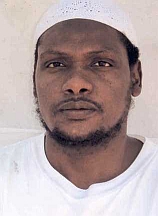
Mustafa Ahmed Adam al-Hawsawi is a Saudi Arabian citizen. He is alleged to have acted as a key financial facilitator for the September 11 attacks in the United States.
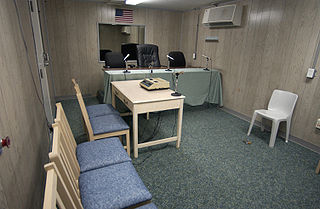
The Combatant Status Review Tribunals (CSRT) were a set of tribunals for confirming whether detainees held by the United States at the Guantanamo Bay detention camp had been correctly designated as "enemy combatants". The CSRTs were established July 7, 2004 by order of U.S. Deputy Secretary of Defense Paul Wolfowitz after U.S. Supreme Court rulings in Hamdi v. Rumsfeld and Rasul v. Bush and were coordinated through the Office for the Administrative Review of the Detention of Enemy Combatants.
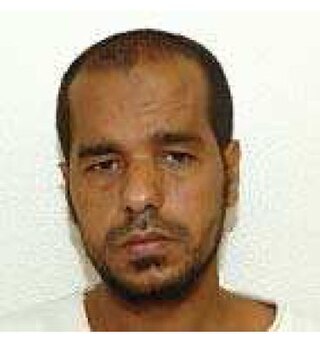
Salim Ahmed Salim Hamdan is a Yemeni man, captured during the invasion of Afghanistan, declared by the United States government to be an illegal enemy combatant and held as a detainee at Guantanamo Bay from 2002 to November 2008. He admits to being Osama bin Laden's personal driver and said he needed the money.
Salah Abdul Rasool Al Blooshi is a Bahraini, who was held in extrajudicial detention in the United States Guantanamo Bay detainment camps, in Cuba.
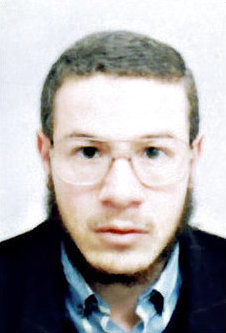
Sabir Mahfouz Lahmar is a Bosnian citizen, who won his habeas corpus petition in United States federal court after being held for eight years and eight months in the military Guantanamo Bay detainment camps, in Cuba.
Abdul Aziz Adbullah Ali Al Suadi is a Yemeni citizen who was held in extrajudicial detention in the United States Guantánamo Bay detainment camps, in Cuba, from May 3, 2002, to January 21, 2016. His Guantanamo Internment Serial Number is 578. The Department of Defense reports that Al Suadi was born on June 16, 1974, in Milhan, Yemen.
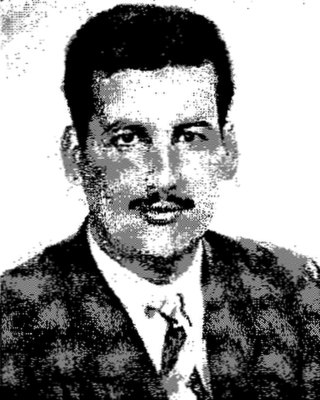
Mohammed Nechle is a Bosnian citizen who was wrongly held for almost seven years as an "enemy combatant" in the United States's Guantanamo Bay detention camps, in Cuba.

Jabir Jubran Al Fayfi is a citizen of Saudi Arabia who was held in extrajudicial detention in the United States Guantánamo Bay detention camp, in Cuba on allegations he trained and fought with al-Qaeda and the Taliban in Afghanistan in 2001.
Abd al Razaq Abdallah Hamid Ibrahim al Sharikh is a citizen of Saudi Arabia who was held in extrajudicial detention in the United States Guantanamo Bay detainment camps, in Cuba.

Abdul Haq Wasiq is the Director of Intelligence of the Islamic Emirate of Afghanistan since September 7, 2021. He was previously the Deputy Minister of Intelligence in the former Taliban government (1996–2001). He was held in extrajudicial detention in the Guantanamo Bay detainment camps, in Cuba, from 2002 to 2014. His Guantanamo Internment Serial Number was 4. American intelligence analysts estimate that he was born in 1971 in Ghazni Province, Afghanistan.
Ali Abdul Motalib Awayd Hassan Al Tayeea is a citizen of Iraq who was held in extrajudicial detention in the United States's Guantanamo Bay detention camps, in Cuba. His Guantanamo Internment Serial Number was 111. The Department of Defense reports that Al Tayeea was born in Baghdad, Iraq. The Department of Defense provided a birthday, or an estimated year of birth, for all but 22 of the 759 detainees. Al Tayeea is one of those 22. He was repatriated on January 17, 2009, after more than seven years without ever been charged.

Mohammed Fenaitel Mohamed Al Daihani is a citizen of Kuwait who was held in extrajudicial detention in the United States Guantanamo Bay detention camp, in Cuba. Al Daihani's Guantanamo Internment Serial Number was 229. Joint Task Force Guantanamo counter-terrorism analysts reports that Al Daihani was born on November 4, 1965, in Kuwait City, Kuwait. Al Dehani was repatriated without charges on November 2, 2005.
Abdul Majid Muhammed is a citizen of Iran who was held in extrajudicial detention in the United States Guantanamo Bay detention camp in Cuba.
Ibrahim Fauzee is a citizen of the Maldives, who was held in extrajudicial detention in the United States's Guantanamo Bay detention camps, in Cuba.
Nasir Maziyad Abdallah Al Qurayshi Al Subii is a citizen of Saudi Arabia who was held in extrajudicial detention in the United States Guantanamo Bay detention camps, in Cuba. His Guantanamo Internment Serial Number was 497. American counter-terror analysts estimate he was born in 1983, in Al Arib, Saudi Arabia.
In United States law, habeas corpus is a recourse challenging the reasons or conditions of a person's detention under color of law. The Guantanamo Bay detention camp is a United States military prison located within Guantanamo Bay Naval Base. A persistent standard of indefinite detention without trial and incidents of torture led the operations of the Guantanamo Bay detention camp to be challenged internationally as an affront to international human rights, and challenged domestically as a violation of the Due Process Clause of the Fifth and Fourteenth amendments of the United States Constitution, including the right of petition for habeas corpus. On 19 February 2002, Guantanamo detainees petitioned in federal court for a writ of habeas corpus to review the legality of their detention.
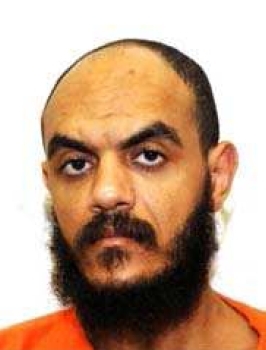
Abdul Rahman Shalabi is a citizen of Saudi Arabia held in extrajudicial detention in the United States Guantanamo Bay detention camps, in Cuba. His Guantanamo Internee Security Number is 42.

Abdul Latif Nasir is a Moroccan man formerly held in administrative detention in the United States Guantanamo Bay detention camps, in Cuba. His Guantanamo Internment Serial Number was 244. Joint Task Force Guantanamo counter-terrorism analysts report he was born on March 4, 1965, in Casablanca, Morocco. Abdul Latif Nasir and Sufyian Barhoumi tried to file emergency requests to be transferred from Guantanamo in the final days of Barack Obama's presidency.
Some Kenyan have ended up captives in the war on terror. The East Africa Standard reported on July 29, 2008, that 19 individuals suspected of ties to al Qaeda apprehended in Kenya in the winter of 2007 were: "removed from police custody by foreign security agents for interrogation."
